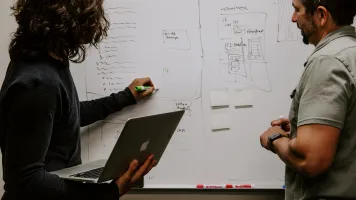How can citizens meaningfully contribute to protecting the environment, monitoring human rights, strengthening educational outcomes, and upholding social accountability in their communities? This is one of the many questions we discussed at CODATA2019, where the conference theme, “Towards next-generation data-driven science” encouraged participants to explore citizen science in many forms.
UNU Institute on Computing and Society (UNU-CS) and UNU Institute for Integrated Management of Material Fluxes and of Resources (UNU-FLORES), hosted “Next generation data assemblages for enhanced citizen participation in sustainable development,” a session to explore data-driven engagement and citizen participation in sustainable development.
The session discussed case studies of citizen participation in data-driven projects across four domains: water quality monitoring (i.e., SDG 6), human trafficking victim identification (i.e., SDG 5, SDG 8, SDG 10, SDG 17), data-driven vocational upskilling (i.e., SDG 4, SDG 8), and social accountability monitoring (i.e., SDG 17, SDG 6).
Six key insights emerged from the discussion:
It is not only about the data.
Other elements within the data ecosystem also matter. These associated elements, which Kitchin and Lauriault define as data assemblages, include “the technological, political, social, and economic apparatuses and elements that constitute and frame the generation, circulation, and deployment of data.”
From the research exploring citizen participation in water quality monitoring, we identified three key success factors: attributes of citizens, attributes of institutions, and processes and mechanisms.
The MobiSAM project, a mobile social accountability and monitoring platform, depended upon key success factors including civil rights education, publicity and awareness, the role of government champions, and the use of varied communication platforms for inclusivity.
Therefore, beyond the data-centric considerations, the associated data assemblages also need to be taken into consideration in order to facilitate effective citizen participation.
You can’t measure what you can’t define.
As such, it is important to engage citizens in defining relevant concepts and metrics.
- The research on water quality monitoring and the MobiSAM project noted various factors that need to be defined, including the different types of freshwater, different types of water quality parameters, as well as different standards of water quality monitoring.
- For the Apprise project, which enhances screenings of vulnerable populations to help identify human trafficking victims, extensive stakeholder engagements helped form a relevant working definition of human trafficking and associated metrics.
Employing participatory approaches to the definition process supports buy-in, strengthens legitimacy, and connects data monitoring to the issues within the local context.
Balancing competing interests among stakeholders and ensuring that marginal voices are heard is crucial towards ensuring the effectiveness of data-driven citizen participation within multi-stakeholder engagements.
The aim is to provide a space for agonistic interactions where often marginalized people can participate and engage. This can be achieved through partnership models and participatory approaches. Apprise used value sensitive design and the value dams and flows technique to ensure that majority perspectives were identified, and that marginal perspectives were also taken into consideration in the design of the data and technology artifacts.
Substantial partnerships, as opposed to instrumental partnerships, are necessary to achieve the goals of empowerment, mutual learning, and democratic participation. Further, local buy-in and having stakeholders with domain expertise and who understand the local contexts are equally important.
- The vocational upskilling project demonstrated how the key role of partnership with the national training authority contributed to success.
- The Apprise project undertook extensive stakeholder engagements while developing question lists as indicators for human trafficking and engages some of these stakeholders in data collection.
- Similarly, the MobiSAM project has key partnerships with local government and civil society stakeholders.
Multiple levels of citizen participation for different initiatives.
Arnstein’s ladder of participation is a key model for thinking about citizen participation. One of the pertinent criticisms of this model is that it suggests a linear trajectory of increasing citizen participation from manipulation to citizen control, implying that citizen control is the end-goal of citizen participation. However, from the various projects in the session, it is clear that citizen participation is varied, contingent, and context-specific.
For example, the MobiSAM project involves basic one-way information sharing from the government to the citizens, as well as citizens interacting with the government for reporting and resolving service delivery issues. As such, a mix of citizen participation realities is prevalent in different initiatives and for different contexts.
A variety of data marginalization and exclusion potentials can hamper the effectiveness of data-driven citizen participation. A typology of data marginalization, discussed during the session, identifies five ways, framed through the “marginalized voices” metaphor, in which citizens can be marginalized in data-driven initiatives:
- “Silent voices” are those who are marginalized due to personal factors that limit their agency for participation, for example, intellectually and developmentally challenged citizens whose participation in citizen science projects would be limited.
- “Muted voices” are marginalized in society by external structural factors and by extension marginalized in data-driven initiatives. For example, the Apprise project noted the marginalization of sex workers, who tend to be stigmatized in society, as well as low-skilled migrant workers.
In conclusion, around the world various efforts are underway to enhancing the use of data to support the achievement of the United Nations 2030 Agenda for Sustainable Development. The Global Partnership for Sustainable Development Data works to support stakeholders including governments, companies, and citizens and civil society groups to leverage the data revolution for sustainable development. The insights from the CODATA session are aligned with and support the findings published by the Global Partnership’s Citizen-Generated Data Task Team, which UNU-CS is a member of, in “Advancing sustainability together? Citizen-generated data and the Sustainable Development Goals”. The session also provided an opportunity for bridging the discussions between and for sharing lessons across the Global Partnership and the CODATA communities towards enhancing the use of data for sustainable development.



